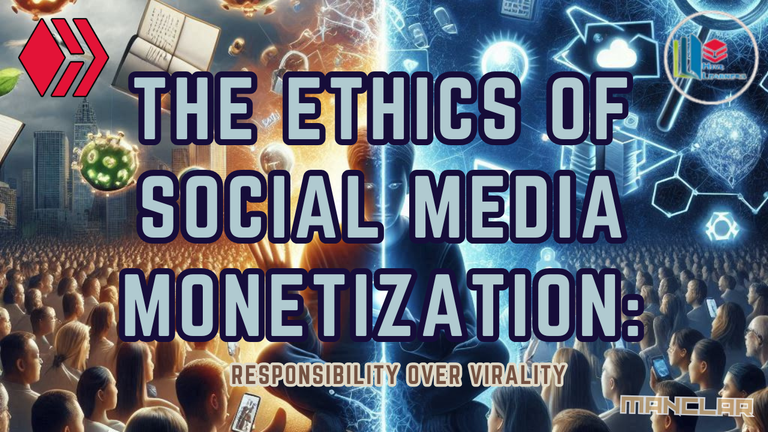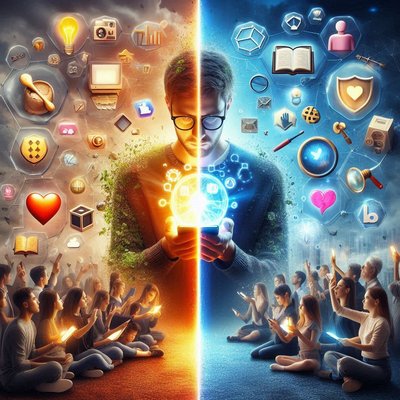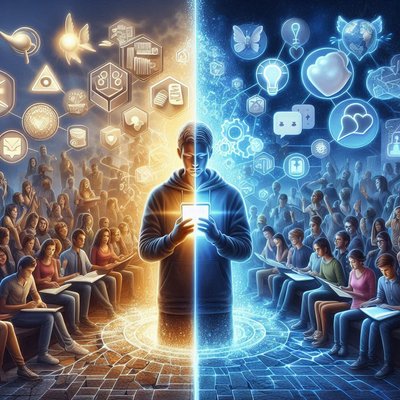The Ethics of Social Media Monetization: Responsibility Over Virality

This is a publication based on the suggested topic proposed in the Hive Learners community through their discord, which on this occasion is "Monetising Social Media".
"Not everything that counts can be counted, and not everything that can be counted counts."
<< Albert Einstein >>


Bing AI
Hello dear readers, I welcome you to another episode of my blog. Today we have a topic that is extremely interesting and it's about monetizing social media.
Nowadays anyone takes the name of content creator; they think they're content creators simply because they upload a post to a social network and try to create controversy.
And in reality, from my point of view, a content creator has a much more intense task.
To be legitimate in content creation, they must precisely have a purpose, whether it's to entertain, educate or provide information about a specific topic. And to achieve this, well, you have to have social responsibility.
What happens today is that all these Gen Z youngsters, those born from approximately the year 2000 to date, have this idea that creating content is uploading anything to a social network, and that's not the case.
Companies and people who pay for promotions of this content are precisely interested in capturing the attention of customers who might acquire their products: customers who try that restaurant's food, people interested in buying that video camera, that swimsuit or that product being offered through this person's image.
Generally they're very famous people who are chosen to do propaganda or advertising for this type of content.
And what happens in many cases with these people is that they use controversy to generate visits.
For example, we have the case of this Argentine content creator Michelo, who uses the Venezuelan government (which we already know is quite dictatorial) to promote that the government is very good and that people live well in the country with good resources.


Bing AI
All his videos follow that tone, and we all know it really generates controversy because the country's reality is very different.
So, it's a way to promote fake news and deceive users. What happens with this is that many people, generally teenagers or those lacking critical thinking, believe this information: they think Venezuela is truly doing well because this content creator tells them so and shows them a fictitious reality.
With this comes what I've recently commented on in other posts: an opinion matrix is created and people's lives can be put in danger.
Such is the case of the challenge that's currently trending in Venezuela, where some teenagers have started recording for social networks the "who cums first loses" challenge, which consists of some young men sitting on the floor erect, spinning a little bottle, girls getting naked on top of them, and whoever ejaculates first loses (the one who lasts longer wins).
This has obviously caused great social commotion, because these helpless kids, without life experience, end up getting girls and teenagers pregnant who then don't know what to do, becoming single mothers at an early age.
And all this simply because it's a viral challenge.
Irresponsible content creators don't warn about the dangers, but instead show the "fun" or irreverent side of the challenge, without social conscience.
So, I believe monetizing a person who creates content promoting this kind of thing should be penalized.
That is, laws should be adjusted so this type of content can't be monetized.


Bing AI
Content that truly contributes to society, that shows what a product is like or that offers serious criticism, that could be monetized.
For example, content could be created warning about the dangers of these challenges. The responsibility isn't with social networks, but with the creators.
In this sense, governments must move forward in creating regulations to establish clear rules about how to create content.
If this doesn't come from governments, it should come from the platforms, prohibiting monetization of certain types of content.
For this, qualified personnel are needed to evaluate content. Governments could grant certifications to responsible creators who pass ethics and quality exams.
Those who have this certification could monetize on any social network.
I don't believe content creation should be eliminated, as it's a job alternative for many.
In my case, it's my livelihood, but I do it responsibly: raising awareness, giving critical viewpoints and showing angles that others don't see.
This is what I have to say about monetizing social networks.

This is my black cat "manclar", this account is to honor his dead (it happened years ago).

Visit the Neon Strike discord, the game of the future today!
 (Discord)
(Discord)
Credits:
Thumbnail image maded using Bing AI and edited with Canva.com
The text dividers were made by me using aseprite
Post translated from spanish to english using Deepseek AI
I agree with you that it's highly essential to regulate how monetisation works on social media, which creativity are encouraged and rewarded, irresponsible content should be white off.
Totally, we need more people with a critical sense and really that they are rewarded content that they contribute, that entertain, who add to society.
Some people are really abusing this opportunity. If a person doesn't have a content to give, they should rest for the day. It's far better than spreading false information or creating contents that will harm the society
Great your comment, people should not publish content just because yes. Each publication must have a meaning, it must represent a contribution, something that eduque, to teach!
Interesting post. Everything you say is true, and especially that the creator has a social responsibility. Without disagreeing at all with what you say, there is one point that I think also needs to be made. Those social phenomena you are talking about, get a lot of hits because their content is liked. And I'll leave it here, I don't want to spend a second thinking about the world I live in.
Best regards @manclar.
That placebo effect given by the "likes" is also the cause that the "content creators" assumptions feel important, and there is a great subject, the psychological aspect, which feel important, powerful, valuable. But I think my friend is missing a lot of education.
I also tell you that I don't think this matter will improve, but quite the opposite. Better than the IAS and machines take over this world, and not that creators without brain, interested in "likes" destroy the planet. 😅
@topcomment
😍😍😍😍😍😃😃😃😃😃😃
Your comment is upvoted by @topcomment
Info - Support - Discord
Just like you said, content creators are more of niche and originality but the ones we have currently are just there for the traffic and nothing bothers them
They are only interested in money, and feeling good. The world is in reverse ...
As a content creator, it's important to prioritize social responsibility over virality, while also ensuring that our content doesn't harm or mislead others.
Also, the governments should work hand in hatds with this media platforms so as to establish clear regulations and certifications for responsible creators.
Thanks for sharing.
🤝
People must begin to take this very seriously, especially those who make a living with this, that I see few serious people. A pleasure to contribute to an issue that I love and enjoy a lot.
Exactly, content creators should prioritize authenticity since their influence can have a significant impact on their audience.
It's great to hear that you're passionate about this topic.
As it should be, to have people who really create content for common well -being
Huhm, well said...
Thanks😐
Reading about that viral challenge, I was like YUCKKKKKKK! Just for the sake of getting likes and earning a few pennies people don't mind losing their dignity.
The phenomenon of becoming non-sense, absurdity and immortality viral isn't that simple. It's pretty complex with intertwined agendas.
With the slogan freedom of expression the human race is gradually becoming indifferent to moral values. The concept of right and wrong is eliminating. Everyone consider it their right to express Whatever they FEEL good. FEELING is the new god.
By making the viral culture viral, all kind of non-sense is being made normal and acceptable. People, who might be reluctant initially or didn’t appreciate the kind of content initially adopted and accepted it as a source of income. Thus more and more people got attracted towards the void of meaninglessness
If governments go on banning certain kind of content, they are regarded as dictatorial and/or violating human rights. Well, that's only the case if government choose to put regulation on immorality. Today's governments are more inclined to save their powers rather than saving save the nation's values. They just ban what's against their might.
Greetings @manclar
Hope you are doing well
In part it is about manipulating the fools with dopamine discharges, they basically focus on that to have control of complete societies.
And talking about feelings, because it is something that has always been hand in hand with this new generation of glass, I remember perfectly well as they say "to talk about how they feel" when they feel hurt by someone or something (which is usually almost everything in general, because they are not able to endure anything, they are extremely vulnerable).
I think that it is necessary that a certificate of creator of content be granted to the person to have the right to monetize content, but this would take us to other problems, such as the mafias and falsifications of the document for example.
Yup, I agree. Nothing is immune from being misused
@manclar, I paid out 0.228 HIVE and 0.050 HBD to reward 5 comments in this discussion thread.